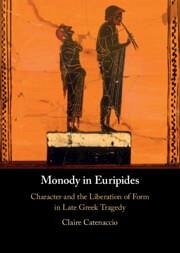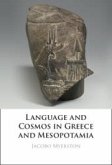The solo singer takes center stage in Euripides' late tragedies. Solo song - what the Ancient Greeks called monody - is a true dramatic innovation, combining and transcending the traditional poetic forms of Greek tragedy. At the same time, Euripides uses solo song to explore the realm of the interior and the personal in an expanded expressive range. Contributing to the current scholarly debate on music, emotion, and characterization in Greek drama, this book presents a new vision for the role of monody in the musical design of Ion, Iphigenia among the Taurians, Phoenician Women, and Orestes. Drawing on her practical experience in the theater, Catenaccio establishes the central importance of monody in Euripides' art.
Hinweis: Dieser Artikel kann nur an eine deutsche Lieferadresse ausgeliefert werden.
Hinweis: Dieser Artikel kann nur an eine deutsche Lieferadresse ausgeliefert werden.








